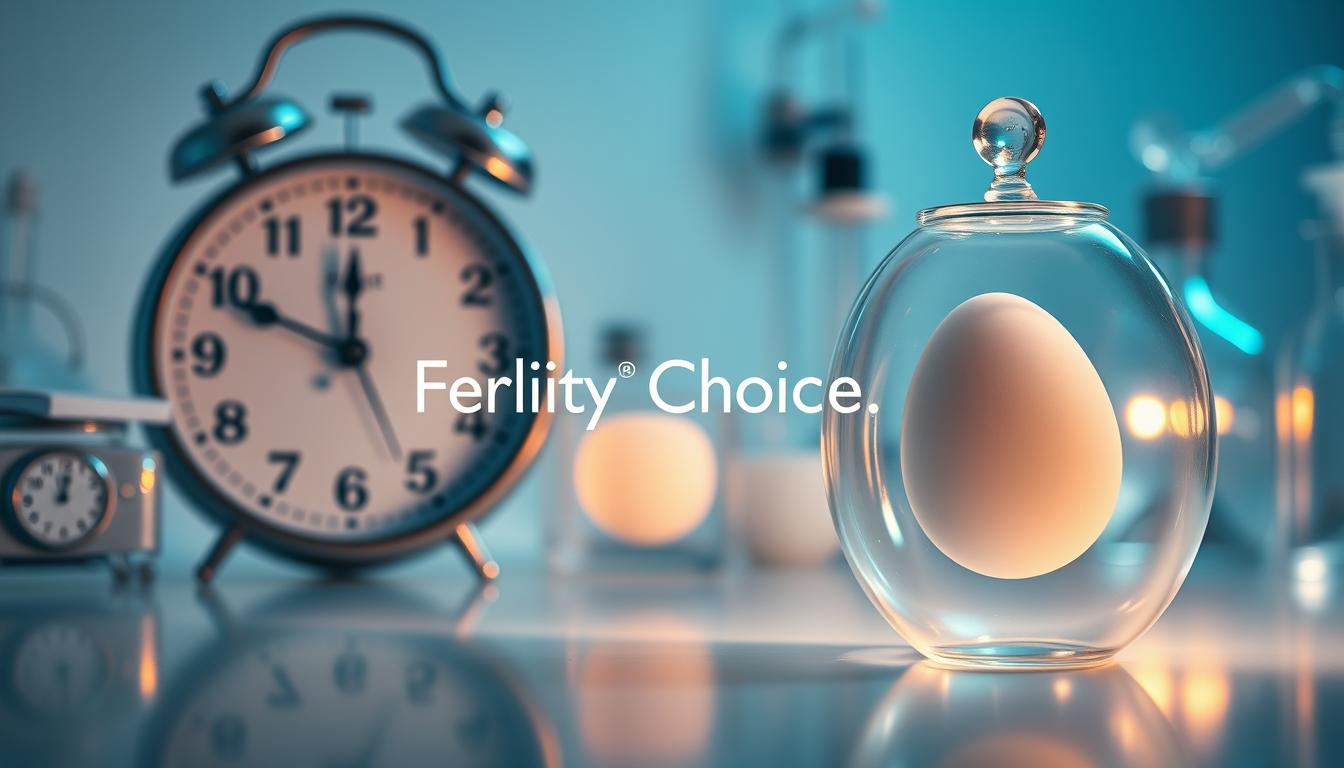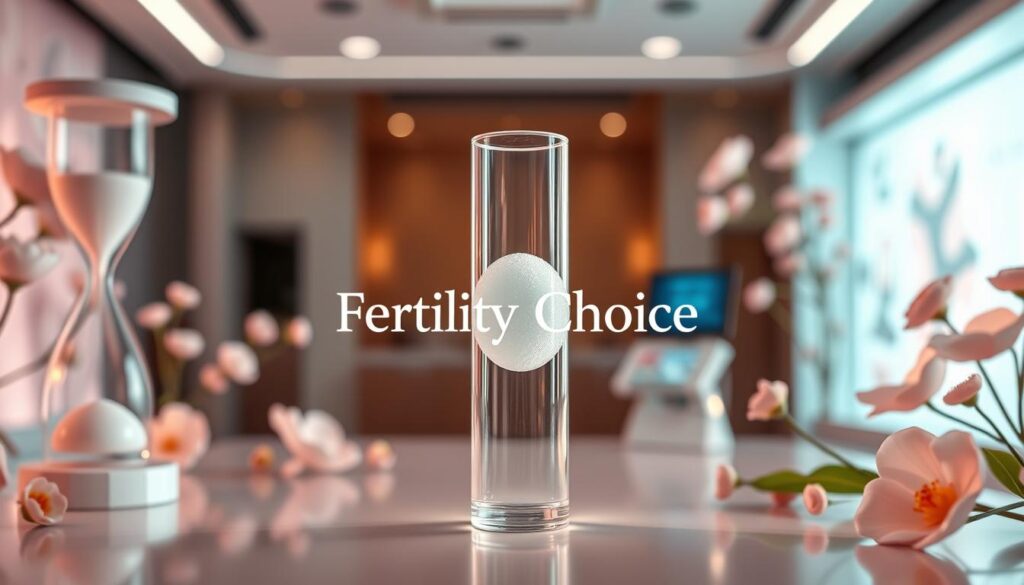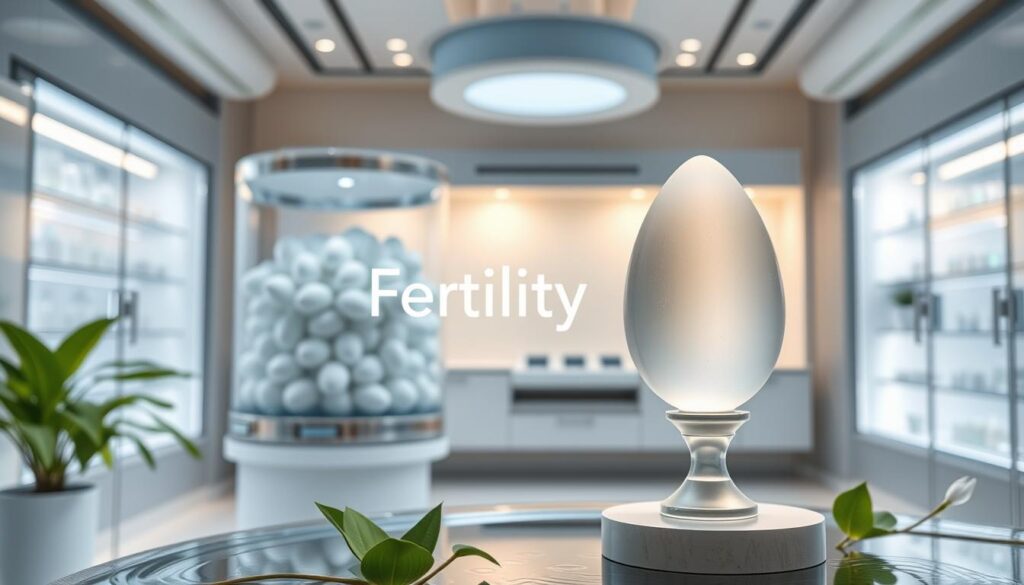
Egg freezing is becoming more popular in South Africa. It’s a way for women to delay having children. The age limit is key, as women are born with many eggs but they decrease with age1. The best time for egg freezing is between 30 to 35 years1.
As women get older, their eggs get worse in quality and number. So, it’s important to freeze eggs when you’re younger. This is often done quickly after a cancer diagnosis to keep fertility before starting treatment2. Tests like an AMH blood test and an antral follicle count help figure out how many eggs you have and how to use medication2.
Egg freezing, or oocyte cryopreservation, is a way to save eggs for later use3. It’s a key option for women who want to delay having children. Knowing about the egg freezing definition and egg freezing process is crucial for making the right choice.
The egg freezing process starts with daily hormone shots for 10–12 days4. Then, eggs are taken out and frozen using a special method. This method is getting more common, but there’s still not much research on how well frozen eggs work after a long time4.
Understanding the egg freezing definition and egg freezing process is key when looking at fertility preservation options. Women who freeze their eggs before 40 have a better chance of getting pregnant later4. Also, eggs from women under 36 have a 95% survival rate after thawing5. This makes egg freezing a good choice for those wanting to save their fertility.
Egg freezing is a good choice for women who want to keep their fertility options open. The reasons for egg freezing include health issues, not finding the right partner, and focusing on career or finances6. It lets women keep their eggs viable, boosting the chances of a successful pregnancy later on6.
The benefits of egg freezing are many. Key advantages include:
The egg freezing costs are high, but many see it as a smart investment in their future3. Egg freezing lets women control their reproductive choices and feel secure about their future.
Recent data shows that women in their 20s and early 30s have better egg freezing success rates3. As women get older, pregnancy risks grow. So, egg freezing is a good choice for those wanting to keep their fertility options open6.
In South Africa, there’s no strict age limit for egg freezing. But, it’s key to know the egg freezing age restrictions and the need for consent for egg freezing. Women start with about 1 – 2 million eggs, which drop as they get older7. Freezing eggs is advised before 35, as egg quality drops fast in the mid-30s7.
The chance of getting pregnant peaks at about 30 years old and then slowly goes down8. After 35, the body’s ability to have kids drops fast8. Freezing eggs works best when women are under 30, with a 50% success rate8.
Knowing the legal age for egg freezing and its factors is vital. This includes understanding consent and the risks and benefits. Women need to be informed about their choices for reproductive health. The consent for egg freezing involves many medical talks, tests, and phases of ovarian stimulation8.
The best time for egg freezing is between 20-30 years old. This is because egg quality drops fast after 35. It’s key to think about your health and what you want in terms of family when deciding.
Younger ages mean better egg quality and higher chances of success. For example, at 37, the chance of a live birth is 51.6% with egg freezing9. Without it, the chance is just 21.9%9. This shows why picking the right age is so important.
Here are some key factors to consider when deciding on the optimal age for egg freezing:
In South Africa, women have their first child at about 25.6 years old9. But, more women are waiting to have kids, making egg freezing popular. In 2016, there was a 17% rise in egg freezing cycles compared to 201510.

| Age | Probability of Live Birth |
|---|---|
| 25-30 | 74%9 |
| 31-35 | 51.6%9 |
| 36-40 | 30%11 |
In conclusion, choosing the right age for egg freezing is crucial. By looking at your own situation and the best age for success, you can make a smart choice about your fertility.
As women get older, their ovarian reserve goes down. This means a drop in egg quality and a higher risk of age-related fertility decline12. Women are born with a limited number of eggs, which gets much lower with age13.
By the mid-30s, the chance of getting pregnant drops a lot. Women aged 35 and up have only a 20% chance of conceiving in any cycle12.
The effect of age on egg quality is big. About 90% of eggs from women over 40 are not viable12. This shows how important it is to think about age-related fertility decline when planning a family. Here’s a table showing how fertility drops with age:
| Age | Chance of Conceiving |
|---|---|
| 30-34 | 20% |
| 35-39 | 10% |
| 40-44 | 5% |
It’s key to know how age, ovarian reserve, and egg quality link up for women thinking about egg freezing14. By understanding the risks and benefits of age-related fertility decline, women can make smart choices about their reproductive health12.
Egg freezing is often misunderstood, leading to confusion. Many believe it’s only for older women. But, the American Society for Reproductive Medicine says the best time is in the 20s and early 30s. This is because eggs are healthier and there’s a bigger number of them15.
Another myth is that egg freezing guarantees a baby. The truth is, success depends on many things like the woman’s age and egg quality. Women who freeze 12 eggs before 35 have a 50% chance of having a baby16. It’s important to know the facts to make good choices about fertility.
Here are some key facts to consider:
By knowing the truth and debunking myths, women can make better choices about their fertility. It’s key to talk to a fertility specialist to find the best option for you.
| Age | Ovarian Reserve | Egg Quality |
|---|---|---|
| 20s-30s | 100,000-150,000 | Higher |
| 40s | Lower | Lower |
Egg freezing helps women of all ages, not just older ones. It’s about when you freeze your eggs, not just your age17. Freezing before 35 boosts your chances of getting pregnant more than freezing after 3517.
The best time to freeze eggs is between 32 and 36 years old. If you’re 30 to 40 and want to delay having kids, think about egg freezing18. But remember, even if you’re under 35, there’s no guarantee you’ll have a baby later19.
Egg freezing helps many women, regardless of their age or background. It’s a personal choice, based on your own situation17. By 30, egg quality and number start to drop, as doctors explain to patients17.
Women under 40 have a better chance of success with egg freezing18. For those under 35, about 14 eggs are needed for an 80% chance of a live birth19.
Egg freezing success rates are key when thinking about this fertility method. It’s important to know that egg freezing guarantees are not 100%20. The chance of having a live baby from frozen eggs varies, from 18% to 32%20. Knowing about egg freezing success rates and guarantees helps set realistic hopes and understand what it can do.

Egg freezing is seen as a way to tackle age-related infertility issues. Yet, it’s more like a gamble than a sure thing21. Women in their 20s or early 30s, not using birth control, have a 20 to 25% chance of getting pregnant each month22. The best time for egg freezing is between 25 and 30 years old for the best chance of a successful birth22.
Egg freezing is a big investment. Knowing the egg freezing costs is key for those thinking about it. The expenses of egg freezing change based on the clinic, where you are, and your personal situation. On average, one cycle of egg freezing costs between $4,500 and $8,00023. Medications to help produce eggs can cost between $4,000 and $6,00023.
There are also ongoing expenses of egg freezing like egg storage. This can cost between $500 and $1,000 a year23. Some companies offer insurance coverage for egg freezing. About 20% of big U.S. companies cover this23.
The table below shows the estimated costs for egg freezing:
| Cost Component | Estimated Cost |
|---|---|
| Initial Consultation | R 1,000 – R 2,000 |
| Egg Freezing Cycle | R 40,000 – R 60,000 |
| Medications | R 10,000 – R 20,000 |
| Egg Storage (per year) | R 2,000 – R 5,000 |
It’s crucial to research and understand the egg freezing costs and expenses of egg freezing before deciding. Look into insurance coverage for egg freezing to find the best option for you24.
Choosing the right clinic for egg freezing is crucial. In South Africa, many egg freezing clinics offer top-notch services. Aevitas Fertility Clinic stands out, with FDA approval and impressive success rates1. They provide a wide range of services, including egg freezing, thawing, and fertilization.
Finding the right egg freezing clinic can be tough. To make a good choice, consider these points:
In South Africa, egg freezing clinics are gaining popularity. These clinics help women preserve their eggs, boosting their chances of a successful pregnancy in the future. When choosing an egg freezing clinic, it’s important to research well. Pick a clinic that fits your needs and offers quality services25.
| Clinic | Services | Success Rates |
|---|---|---|
| Aevitas Fertility Clinic | Egg freezing, thawing, fertilization | High success rates1 |
Egg freezing brings up big questions about legal implications and ownership of frozen eggs. It’s key to know these to protect your rights and duties26. The ethical considerations of egg freezing also matter a lot, as they affect the well-being and freedom of those involved27.
One major legal issue is consent. Many women freeze their eggs because of health treatments that might harm their fertility26. It’s crucial to have clear consent rules to safeguard those going through this.
The table below highlights some important legal points about egg freezing:
| Consideration | Description |
|---|---|
| Ownership of Frozen Eggs | The person who freezes their eggs usually keeps ownership of them27 |
| Consent | It’s important to have consent rules to protect people’s rights during egg freezing26 |
| Ethical Considerations | Ethical issues in egg freezing deal with the well-being and freedom of those involved28 |
In summary, egg freezing’s legal side is complex. We must think about who owns the eggs, consent, and ethics. This ensures people know their rights and duties262728.
The future of egg freezing in South Africa is looking bright29. New technology in fertility preservation is making it more effective. This means more women can keep their fertility options open.
The cost of egg freezing is going down, and more insurance covers it30. This makes it easier for more people to consider it.
People’s views on preserving fertility are changing too31. Women are seeing the value in freezing their eggs, even if they’re facing health issues. As more women learn about this, the need for egg freezing will grow.
This growth will lead to even more improvements in the field293130. It’s a positive trend for women’s reproductive health in South Africa.
Stay Connected and Get Personalized Assistance
Thank you for reading! We hope you found this post helpful and informative. If you have any questions or need further assistance, please reach out. We’re here to help you on your journey
